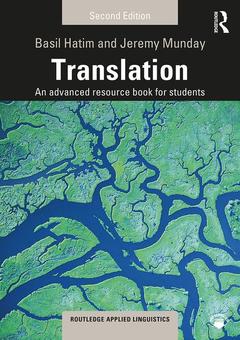Translation (2nd Ed.) An advanced resource book for students Routledge Applied Linguistics Series
Auteurs : Hatim Basil, Munday Jeremy

Translation, Second Edition introduces the theory and practice of translation from a variety of linguistic and cultural angles, and has been revised and updated to feature:
- a study of translation through the lens of key topics in linguistics such as semantics, functional linguistics, corpus and cognitive linguistics, discourse analysis, gender studies and postcolonialism;
- a wide range of examples from other languages, including French, Spanish, German, Italian, Russian and Arabic, with English back-translations to assist comprehension;
- material from a variety of sources, genres and text-types, such as advertisements, religious texts, reports for international organizations, videogames, literary and technical texts;
- influential readings from the key names in the discipline, including Jean-Paul Vinay and Jean Darbelnet, Eugene Nida, Werner Koller and Ernst-August Gutt, and contains new readings from Mona Baker, Michael Cronin, Kim Grego, Miguel A. Jiménez-Crespo, Kevin Gary Smith, Harald Martin Olk, Carmen Mangiron and Minako O?Hagan.
Additional resources for the book can be found at www.routledge.com/9780415536141.
Written by two experienced teachers, translators and researchers, Translation remains an essential resource for students and researchers of translation studies and Applied Linguistics.
Acknowledgements
How to use this book
SECTION A INTRODUCTION
Unit 1 What is translation?
Unit 2 Translation strategies
Unit 3 The unit of translation
Unit 4 Translation shifts
Unit 5 The analysis of meaning
Unit 6 Dynamic equivalence and the receptor of the message
Unit 7 Textual pragmatics and equivalence
Unit 8 Translation and relevance
Unit 9 Text type in translation
Unit 10 Text register in translation
Unit 11 Text, genre and discourse shifts in translation
Unit 12 Agents of power in translation
Unit 13 Ideology and translation
Unit 14 Translation in the digital era
SECTION B EXTENSION
Unit 1 What is translation?
Unit 2 Translation strategies
Unit 3 The unit of translation
Unit 4 Translation shifts
Unit 5 The analysis of meaning
Unit 6 Dynamic equivalence and the receptor of the message
Unit 7 Textual pragmatics and equivalence
Unit 8 Translation and relevance
Unit 9 Text type in translation
Unit 10 Text register in translation
Unit 11 Text, genre and discourse shifts in translation
Unit 12 Agents of power in translation
Unit 13 Ideology and translation
Unit 14 Translation in the digital era
SECTION C EXPLORATION
Unit 1 What is translation?
Unit 2 Translation strategies
Unit 3 The unit of translation
Unit 4 Translation shifts
Unit 5 The analysis of meaning
Unit 6 Dynamic equivalence and the receptor of the message
Unit 7 Textual pragmatics and equivalence
Unit 8 Translation and relevance
Unit 9 Text type in translation
Unit 10 Text register in translation
Unit 11 Text, genre and discourse shifts in translation
Unit 12 Agents of power in translation
Unit 13 Ideology and translation
Unit 14 Translation in the digital era
Developing words and cultures – some concluding remarks
Glossary
Bibliography
Index
Basil Hatim is a theorist in English/Arabic translation and a translator/interpreter. He has worked and lectured at universities worldwide and has published extensively on applied linguistics, text linguistics translation/interpreting and TESOL. He has authored or co-authored several books. He has served on the editorial boards of several major journals and has published some 50 papers in a diverse range of international refereed journals.
Jeremy Munday is Professor of Translation Studies at the University of Leeds, UK. His specialisms are: linguistic translation theories, discourse analysis, ideology and translation, and Latin American literature in translation. He is author of Introducing Translation Studies (Routledge, 4th edition, 2016) and Evaluation in Translatio (Routledge, 2012).
Date de parution : 08-2019
17.4x24.6 cm
Date de parution : 08-2019
17.4x24.6 cm
Thème de Translation :
Mots-clés :
Translation; Basil Hatim; Jeremy Munday; Translation Studies; Arabic; Werner Koller; cognitive linguistics; corpus linguistics; discourse analysis; English; Ernst-August Gutt; Eugene Nida; French; functional linguistics; gender studies; German; Harald Martin Olk; Italian; Jean Darbelnet; Jean-Paul Vinay; Kevin Gary Smith; Kim Grego; Michael Cronin; Minako O‘Hagan; Mona Baker; postcolonialism; Russian; Semantics; Spanish; translator; Carmen Mangiron



